When a customer becomes an acquisition
Are medical OEMs following the path blazed by automotive and electronics companies and spinning off in-house manufacturing to tier suppliers?

“Hospira, like many healthcare OEM’s, and those in a number of other industries, determined that investing their resources in turning pellets into parts was no longer strategic. Their capital was better invested in other areas.”
That’s how John Berg, director of marketing at injection molding, mold, multishot equipment, and automation supplier MGS Mfg. Group, described the path medical device OEM Hospira found itself on, which eventually led to MGS acquiring Hospira’s Buffalo, New York injection molding facility. This operation produces parts for the delivery of liquid injectable pharmaceuticals and IV solutions.
MGS evaluates several “transfer program opportunities” every year, according to Berg, who noted that the reasons for outsourcing what was once an in-house capability are generally the same for the OEM, regardless of their industry.
“A relatively common theme for OEM’s with captive molding capabilities is dealing with aging equipment and the sizeable cost of new machine investments along with facility improvements for optimization,” Berg explained. Those optimizations can run the gamut from more efficient material handling systems, to upgrading metrology lab equipment, increasing power requirements, and investing in automation or a general expansion.
Announced in mid-April to plant employees, who will be retained by MGS, the transaction is expected to close by the end of June. The Buffalo facility employs 120 and has 40 injection molding machines, ranging in clamp force from 100 to 400 tons. The acquisition will give MGS six manufacturing locations and increase its total number of injection molding machines from about 195 to 230.
Berg said MGS’s relationship with Hospira goes back to about 2006, which was around the time the company was spun off from Abbott Laboratories. In that year, MGS purchased an existing clean room molding operation in Antioch, Illinois, using that facility to establish its presence in the medical industry. Since then, the presence has grown, both organically, thanks to MGS’s technology portfolio, and via acquisition [sometimes of one-time customers].
“As the healthcare industry develops the next generation of plastic products, MGS’ multishot tooling, molding and equipment technologies coupled with our in-house automation capabilities lend themselves to the small part + multi component assemblies that are necessary in the manufacture of these products,” Berg explained.
In a release, Paul Manley, MGS Chief Operating Officer and Chief Financial Officer, indicated more medical activity is in the company’s future. “MGS has made, and will continue to make, substantial investments in manufacturing technologies and capabilities to increase service to our healthcare industry customers.”
Related Content
-
Medical Molder, Moldmaker Embraces Continuous Improvement
True to the adjective in its name, Dynamic Group has been characterized by constant change, activity and progress over its nearly five decades as a medical molder and moldmaker.
-
Seaway Plastics Acquired
Private equity firm ICG purchased the injection molder and its three facilities located in Florida and California.
-
Wisconsin Firms Unite in Battle Against Covid
Teel Plastics opened new plant in record time, partnering with AEC & Aqua Poly Equipment Co. to expand production of swab sticks to fight pandemic.













.png;maxWidth=300;quality=90)


